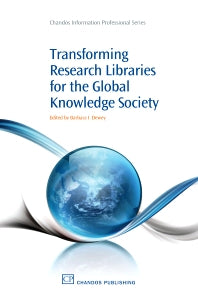Freshly Printed - allow 10 days lead
Couldn't load pickup availability
Transforming Research Libraries for the Global Knowledge Society
Barbara Dewey (Edited by)
9781843345947, Elsevier Science
Paperback / softback, published 1 September 2010
208 pages
23.4 x 15.6 x 1.4 cm, 0.37 kg
"The book presents an optimistic perspective of research libraries that should emerge from the transformational processes with increased responsibilities and possibilities to face them." --Information Research
Transforming Research Libraries for the Global Knowledge Society explores critical aspects of research library transformation needed for successful transition into the 21st century multicultural environment. The book is written by leaders in the field who have real world experience with transformational change and thought-provoking ideas for the future of research libraries, academic librarianship, research collections, and the changing nature of global scholarship within a higher education context.
Dedication List of figures and tables About the authors Chapter 1: Transforming research libraries: an introduction Introduction Transformation from different perspectives Relevance and effectiveness Organizing for successful collaboration Creation literacy: an example of the transformation journey Knowledge creation is global Conclusion: building to scale at the interfaces of cultures Part 1: Framing the Twenty First-Century Research Library Chapter 2: Advancing from Kumbaya to radical collaboration: redefining the future research library Collaboration and innovation Radical collaboration Strategic leadership for preservation Accountability and assessment Library space and collaboration Big science and data curation Faculty relationships The 2CUL Project Conclusions Chapter 3: Will universities still need libraries (or librarians) in 2020? Introduction Contours of change What will the university’s information needs be in 2020? The ‘library’ in 2020 ‘Librarians in 2020’ Some conclusions Chapter 4: Transforming research libraries: Piano, piano, si va lontano Starting at the top Leading organizational transformations An enabling vision Creating opportunities for others to do the right things The acquisition of knowledge, professional networks, and partners Transformative, collaborative priorities The continuing involvement of the user community Piano, piano, si va lontano: toward lasting transformations Chapter 5: The transformation of academic libraries in China Yesteryear’s libraries Today’s libraries Staffing: recovery Collections and collection development Library buildings Summary and challenges Part 2: Organization and the University Context Chapter 6: Organizational and strategic alignment for academic libraries Introduction The strategy focused organization Aligning strategies to performance Strategic alignment in the academic environment Strategic alignment for academic libraries Organizational alignment for libraries Organizational and strategic alignment for libraries – the leadership challenge Acknowledgements Chapter 7: Building key relationships with senior campus administrators Introduction About McMaster University Human performance technology Systems theory Applying the HPT model, phase one: performance analysis Phase two: cause analysis Phase three: intervention (selection and implementation) Phase four: evaluation Conclusion Appendix A: Interview questions Appendix B: Focus groups Appendix C: Web survey questions Part 3: Partners and Collaborative Environments Chapter 8: Partnerships and connections Partners defined Engaging partners Sustaining partners Partnering skills Future partners Chapter 9: Common spaces, common ground: shaping intercultural experiences in the learning commons Impetus for change The commons concept The role of Web 2.0 A learning commons and ‘Ready for the World’ Common Ground Book Club The Sparky Awards Commons World Film discussion series Programming for international students Conclusion Part 4: Creating Accessible and Enduring Scholarship Chapter 10: New modes of scholarly communication: implications of Web 2.0 in the context of research dissemination Introduction Scholarly communication Social web and interactive tools Scholarly communication and implications of Web 2.0 Developing academic library services towards scholarly communication 2.0 Conclusions Chapter 11: Coming home: scholarly publishing returns to the university Introduction Digital publishing issues Campus publishing stakeholders Creators University publishing as commodity Publishing: a university priority Conclusion Chapter 12: Confronting challenges of documentation in the digital world: the Human Rights Documentation Initiative at the University of Texas Introduction The birth of the Human Rights Documentation Initiative Mission and scope of the HRDI Building external partnerships Access Privacy Archiving the Internet Collaboration Conclusion Appendix 1: List of Human Rights Documentation Initiative personnel Index
Subject Areas: Academic & specialist libraries [GLMA], Library & information sciences [GL]


